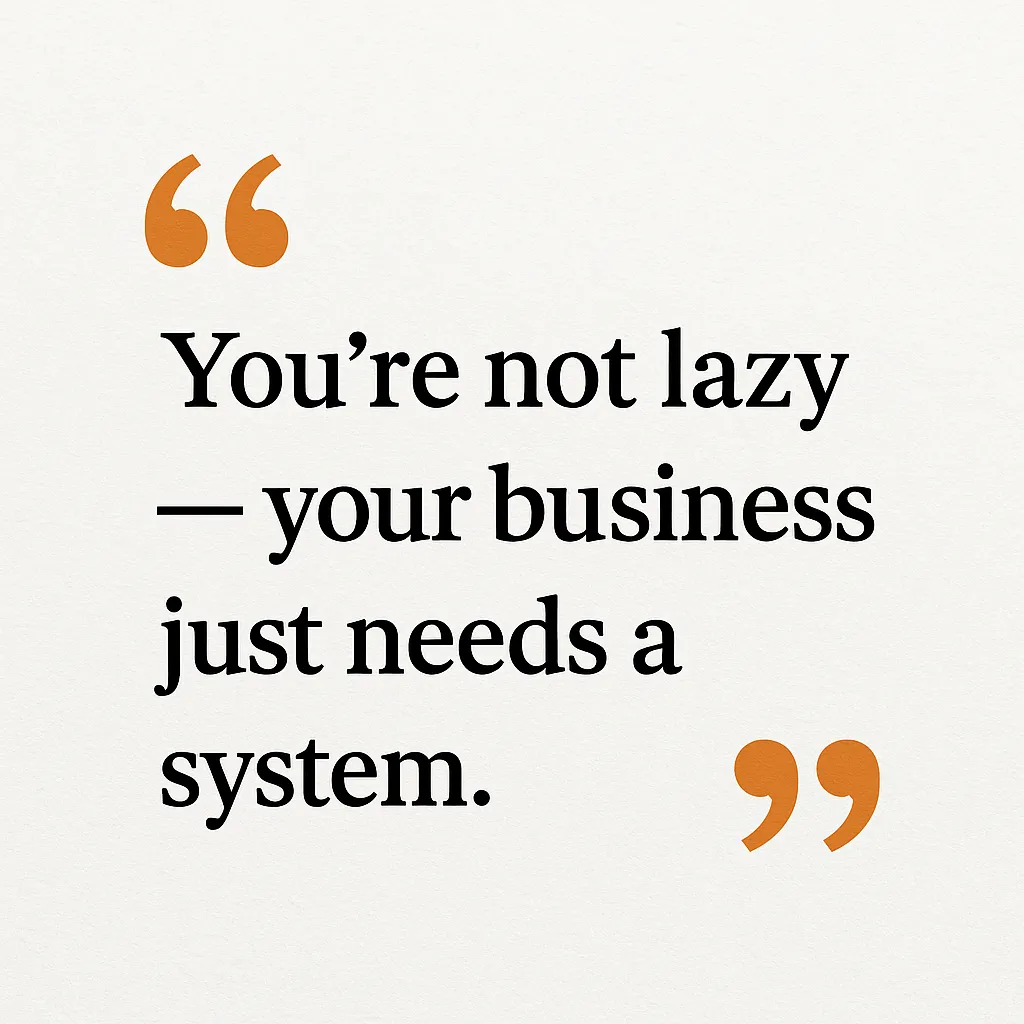
You’re Not Lazy—You Just Don’t Have a Growth System (Yet)siness - Copy
You’ve probably said it to yourself more than once:
“Why can’t I just stay consistent?”
“If I were more disciplined, my business would be further along.”
But here’s the truth — you’re not lazy. You’re running your business without a system that supports growth.
Every day you wake up to a to-do list that never ends. You react to problems, firefight issues, and chase opportunities. But you rarely feel in control. It’s not because you lack ambition or drive. It’s because you’re relying on willpower instead of structure.
Most small business owners don’t fail because they don’t work hard enough. They fail because they try to scale chaos.
You don’t need to “motivate” yourself more — you need a Growth System that makes progress inevitable.
Let’s break down what that means and how to build one that actually fits your business.
When you started your business, you probably ran on pure energy. You said yes to everything, worked late nights, and powered through with coffee and adrenaline.
That worked — for a while.
But once your revenue grew past the €100K mark, things changed. More clients meant more admin. More projects meant more decisions. And more team members meant more complexity.
Now your days look something like this:
You’re constantly context-switching between delivery, sales, and management.
Your team relies on you for every answer.
You start the day with plans but end up putting out fires.
Important projects get delayed because you’re stuck in the weeds.
At night, you think: “I know what I should be doing — why can’t I just do it?”
Here’s the uncomfortable truth: you’re not short on discipline — you’re short on systems.
Without clear, repeatable processes, everything depends on your personal energy. And the moment your energy dips, so does your consistency. That’s not laziness — it’s simply poor design.
The businesses that grow consistently don’t have superhuman founders. They have systems that make consistency easy and burnout almost impossible.
Let’s introduce a simple concept I call The Growth System Pyramid — the three-layer structure that keeps small businesses focused, efficient, and scalable.
Imagine a pyramid with three layers:
Clarity (Top)
Systems (Middle)
Habits (Base)
Most entrepreneurs try to build growth from the top down — they set big goals (“hit €500K this year”) but have no process or routine underneath to support them. The pyramid collapses.
Here’s how it really works:
1. Habits (Base)
Your daily and weekly rhythms.
These are the simple, repeatable actions that keep your business moving forward. Things like:
Weekly planning meetings
End-of-day task reviews
Checking key numbers every Monday
Without these, everything feels reactive.
2. Systems (Middle)
These are your documented, repeatable processes for how the business runs.
For example:
How leads are captured and followed up
How clients are onboarded
How tasks are delegated and tracked
Systems create consistency. They make performance predictable, even when you’re tired, on holiday, or growing fast.
3. Clarity (Top)
Once your base and systems are in place, clarity becomes simple.
Now you can ask:
What’s the one growth goal this quarter?
Which activities actually drive results?
What can we stop doing?
When you build from the base up — Habits → Systems → Clarity — you move from chaos to control. You start working on the business, not just in it.
That’s the “aha” moment most entrepreneurs never reach: growth doesn’t come from doing more — it comes from designing how work happens.
You don’t need complicated software or consultants to start. You just need a simple structure that helps you and your team operate consistently.
Here’s how to build your own Growth System in four practical steps:
Step 1: Start with the “Core Four” Processes
Document just four critical systems first — the ones that affect profit and time the most.
Lead generation: How new enquiries come in and get followed up.
Sales: How you qualify, quote, and close clients.
Delivery: How you ensure consistent results every time.
Admin: How you handle money, invoices, and communication.
Don’t overthink it. Write it down in plain language — or record a Loom video walking through each process.
Step 2: Create a Weekly Operating Rhythm
Your calendar is the heartbeat of your business. Create repeatable routines:
Monday: Review key numbers and priorities.
Wednesday: Team check-in and bottleneck review.
Friday: Wins + lessons learned.
Once these rhythms are protected, decisions get easier and communication becomes proactive, not reactive.
Step 3: Automate and Delegate Small Tasks
Ask: “What do I repeat every week that someone else (or software) could do?”
Use automation for admin. Delegate what’s below your pay grade. Every hour you free up can be spent on growth activities.
Step 4: Track Progress Publicly
Create a simple dashboard or scorecard your team can see — even if it’s a spreadsheet.
When everyone sees the same numbers weekly, accountability becomes culture.
Over time, this system builds momentum. You’ll find yourself working fewer hours but achieving more. That’s not magic — it’s structure.
You’re not lazy — you’re human. You’ve been trying to scale with effort instead of systems, and that’s a recipe for burnout.
The good news? You can fix it — starting today.
If you’re ready to stop running on adrenaline and start running on process, take 15 minutes to complete a Growth System Scorecard. It’ll show you exactly which part of your business pyramid needs attention first — habits, systems, or clarity.
This isn’t about hustling harder. It’s about building a business that works even when you take a day off.
Because you don’t need more discipline.
You just need a system that makes discipline automatic.
